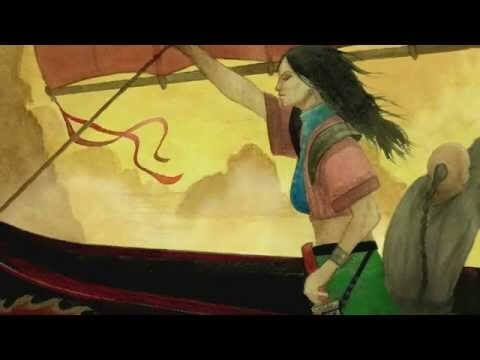Meet the 19th-century female pirate who launched a thousand (pirate) ships

This week’s entry: Ching Shih
What it’s about: Blackbeard and Calico Jack can’t hold a peg leg to Ching Shih, a 19th-century South China Sea pirate who took over her husband’s criminal enterprises to become one of the most feared and successful marauders in history.
Biggest controversy: In 1801, a 26-year-old Ching Shih was working as a prostitute in Guangzhou when she met Zheng Yi. While it’s possible that there was some genuine sentiment that contributed to their subsequent engagement, the arrangement was largely one of business. The marriage gave Ching a 50 percent share of Zheng’s family pirating business, while Zheng benefited from Ching’s own business savvy, cashing in on the secrets she extracted from her wealthy, politically connected clients. Ching and Zheng had two children together before Zheng fell overboard—amidst mysterious circumstances—to his death.
The real scandal began when, three years before meeting Ching, Zheng Yi kidnapped a teenage boy named Cheung Po. He took him on as a slave, pressing him into service (no doubt promising each night that he’d likely kill him in the morning). Cheung quickly became Zheng’s right-hand man, and, if rumors are to be believed, his lover. When Zheng and Ching married, they adopted Po as their heir, and he captained their pirate fleet as Cheung Po Tsai (“Tsai” translating roughly to “The Kid”).
After Zheng’s death, Ching, anticipating a struggle with Cheung over the control of Zheng’s fleet, strategically instigated an intimate relationship with him in order to secure his loyalty. After appointing him her second-in-command (and the official captain of the fleet, as a woman couldn’t technically hold that title), she had their mother-son relationship legally dissolved so she could marry him, thus sealing the deal on their partnership. Ching later had two more children with her former stepson.
Strangest fact: Ching became a successful outlaw in part by issuing and ruthlessly enforcing her own code of laws. Pirates under her command were ordered not to steal from the villages that supplied her fleet, and to offer up the lion’s share of any earned booty to be used for the good of the fleet at large. This pirate’s take on redistribution of wealth necessitated that when a ship made an unsuccessful raid, it would still get a share of money from the ships that had been successful. Ching also had strict rules about female prisoners. A pirate could take a captive as his wife or concubine, but rape, and even consensual sex with a prisoner, were punishable by death. The man would be beheaded, and the captive woman thrown overboard. Ching ran such a tight ship that she built a remarkably disciplined fleet “that was intrepid in attack, desperate in defense, and unyielding even when outnumbered.”
Thing we were happiest to learn: Considering the breadth of her command, Ching was not so much a pirate as she was an admiral. After her husband’s death, she took pains to keep his family on her side, and then used a combination of persuasion and force to unite previously feuding pirate groups under her banner. At her peak, she commanded more than 300 ships (compared to the current Chinese navy’s 492) and 20,000-40,000 pirates. In 1808, the Chinese government attempted to destroy Ching’s fleet, and her pirates managed to capture so many ships that the government was reduced to conscripting fishing boats into its navy.
Thing we were unhappiest to learn: Ching’s reign came to an epic end when she got tangled up in battle with not only the Chinese navy, but the British and Portuguese navies as well, not to mention rival pirate fleets. In 1810, after a string of small losses, her fleet was finally vanquished by the Portuguese navy in the Battle Of The Tiger’s Mouth. But even in defeat, Ching managed to turn things around in her favor. She negotiated a treaty with the Chinese government that, in exchange for her surrender, saw only 126 pirates executed, 211 banished or exiled, and nearly 17,000 given full amnesty. Cheung Po Tsai even became a colonel in the Chinese navy, and spent the rest of his career fighting pirates for the Chinese government. After her young husband died at sea, Ching returned to Guangzhou to open a brothel. She died at the age of 69.
Best link to elsewhere on Wikipedia: For anyone interested in taking a deeper dive into Chinese history, Wikipedia offers an endless scroll of information about Ching Shih’s great rivals, the members of the Qing Dynasty. The dynasty was established in 1636, and within just eight years it had supplanted the Ming Dynasty as rulers of China. It built the fourth largest empire in the history of the world and remained in power until 1908, when the emperor was poisoned. China fast dissolved into chaos, and after years of push for reform by Sun Yat-sen, the 2,000-year-old empire became a republic.
Further down the Wormhole: In addition to terrorizing the South China Sea, Ching has also crossed swords with a number of fictional pirates. She’s been portrayed by Takayo Fischer (Pirates Of The Caribbean: At World’s End) and Maggie Q (the miniseries Red Flag), and Jorge Luis Borges fictionalized her life in his short story “The Widow Ching-Pirate.” Most of these fictional accounts pale in comparison to the legend’s real-life adventures. But that may be because they never took to the sky, unlike another famous buccaneer, TaleSpin’s Don Carnage, the gleefully over-the-top villain of the short-lived but beloved Disney animated series. The show inexplicably recasts The Jungle Book’s Baloo as a swashbuckling bush pilot who tangles with Carnage, Shere Khan, and a who’s-who of guest voices, including Phil Hartman, whose vocal talent served him well on Saturday Night Live, The Simpsons, and a long career in both film and television until his shocking murder 20 years ago. We’ll remember the man whose co-stars affectionately called “The Glue” when The A.V. Club observes 1998 Week.